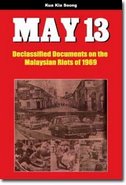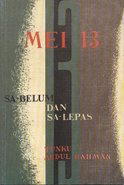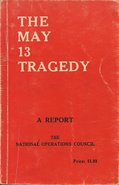The Star, Sunday November 9, 2008
In this first of a two-part series, Sunday Star looks at the terms ‘social contract’, ketuanan Melayu and Article 153 of the Federal Constitution that have been the subject of public debate of late. Of the three, only the last is articulated in writing, but are they interchangeable?
TAN Sri Dr Abdul Aziz Abdul Rahman, 75, retired as MAS managing director in 1991 after 20 years there. He is currently legal adviser for the Malay National Consultative Council. More important, the senior lawyer was legal officer to the National Operations Council in the aftermath of the 1969 race riots. The following are excerpts of an interview with Sunday Star where he shares his views on the ‘social contract’.

Abdul Aziz: 'I don't think the definition is important but what is attached to its meaning'
Many use the terms “social contract”, Article 153 of the Federal Constitution and Ketuanan Melayu as if they are one and the same. What is your understanding of the three terms?
The term “social contract” is something new. It didn’t appear in the Merdeka talks and I never heard it used when I was involved in drafting some of the laws when I was in the National Operations Council.
So I did some research. It is a term used by Western philosophers to describe a political relationship between the state and civil society: normally the state imposes obligations and in return it provides protection.
It has nothing to do with the various components of society. I don’t know how that term came to be used here.

Hot topic: Newspaper clippings on the public debate over the term 'social contract'.
It appears Tan Sri Abdullah Ahmad was the first to use the term in a speech in 1986in Singapore. The speech was published in The Star on Aug 31 of that year.
In the 1980s, some politicians started using it. Over the years, from what I’ve read, different people have different interpretations, depending on their intentions.
Now, almost everyone accepts it to mean the bargain or compromise between the three races when they submitted their memorandum to the Reid Commission in asking for independence.
But if we look deeper, I am inclined to define it according to the original thought. What aspect of the compromise among the three races, the Malay Rulers, the British and minorities like the orang asli were of concern?
There were a number of difficult issues when the Constitution was being drafted. Among others, they were the separation of state and federal powers, Islam and the freedom of religion, protection of the Rulers’ position, the powers of the Conference of Rulers, the national language and other languages, and citizenship.
We can’t say these issues relate only to the three major races. We must include the Malay Rulers and the British, and the minorities. If we want to define social contract, it must embrace all of these and not just the special position of the Malays and non-Malay citizenship.

Today, everyone, including the Conference of Rulers, uses the term “social contract”. Since everyone seems to have accepted it, then we need to define it properly.
Who should be working on this definition?
I don’t think we can... it is evolving. Let the future generations evolve it some more and then... Then again, I don’t think the definition is important but what is attached to its meaning. Certain people have certain objectives – then it becomes controversial.
Is there a connection between Article 153 and the term “social contract”, which has become the common label for the inter-ethnic bargain?
If you take “the social contract” as the inter-ethnic bargain, then yes. According to the records, there was a bargain among the Malays and non-Malays and Article 153 is part of this. But that does not mean that is the social contract.
Before independence, there were nine Malay states and two colonies (Penang and Malacca). Each Malay state was independent and sovereign powers were vested in the Rulers. They were not colonies but protectorates. In 1946, the British tried to form a unitary government called the Malayan Union but it was abandoned.
Finally, the Federation of Malaya was formed; each state and individual Ruler had sovereign power but certain powers were surrendered to the High Commissioner. This has great significance: citizenship came under the state as the people were the rakyat of the Ruler.
When independence was negotiated the people were represented by Umno, MCA and MIC. But who did they ask independence from? It was from the British and the Malay Rulers (as sovereign rulers).
Is that the basis for Article 153 which puts the onus on the Rulers to safeguard the special position of the Malays and natives, themselves and Islam as well as protect the legitimate interests of the non-Malays?
If the Rulers did not agree to independence, it would never have happened. Many have ignored this point and treat the Rulers as ordinary people but they had sovereign rights.
 In the negotiations – the main group was the people who were represented by the political parties that prepared a memorandum for the Reid Commission. The Rulers also prepared a memo on what they wanted. The British also put a condition to granting independence: that there must be peace and harmony and that all must be happy.
In the negotiations – the main group was the people who were represented by the political parties that prepared a memorandum for the Reid Commission. The Rulers also prepared a memo on what they wanted. The British also put a condition to granting independence: that there must be peace and harmony and that all must be happy.The Commission then prepared a draft but almost all parties had problems with it. The Malays were very unhappy with the proposal to review Article 153 after 15 years. The non-Malays and the Rulers were also unhappy.
Because of this, a tripartite working party was formed to thrash out matters related to citizenship, a time limit on Article 153, rights of the Conference of Rulers and the right of Rulers to be head of religion in their own states.
They had 28 meetings, I think. It comprised four representatives each for the people (two Umno, one MCA and one MIC), the British and the Malay Rulers.
One reason why Umno objected to a limit on Article 153 was because the special position of the Malays was already embodied in Clause 19(1)(d) of the Federation of Malaya Agreement 1948. It states there that the British High Commissioner shall safeguard the special position of the Malays, which included a quota system. (See table for the 1948 quotas)
I, myself, was a beneficiary of a federal scholarship in 1953. I was from Kelantan and my father was a Malay school teacher. I went to the then University Malaya in Singapore. Some of my friends got state scholarships to study locally.
Other races should accept these privileges because they have always been there.
A lot of people misunderstand Article 153. It is an enabling provision for the King, through the Government, to implement policies as reasonably as possible. If they don’t, then throw the Government out!
You can’t question Article 153 but you can certainly question its implementation. It was the intention of those who drafted this provision that the government would be just. You must be just, you must be fair in exercising your rights.
Few make issue with giving a discount to housebuyers from segments of society that are poor. What many object to is an across the board policy for race rather than need. Why should a millionaire Malay get a discount to buy a million-ringgit house?
That shouldn’t be the case. I agree. The leaders should go through all the policies and see which are unfair.
For example, if there is only one house and you and I apply for it. I am poorer and a Malay so I should get the house. If there are two houses, you also should get.
 But if we’re both poor and there is only one house?
But if we’re both poor and there is only one house?Then the Malay gets the house.
Some Barisan Nasional politicians equate questioning the implementation of affirmative action policies to breaching the law which prohibits questioning the special position of the Malays.
It is all right to question the implementation. I say this because I drafted that law, that is the amendment to the Sedition Act 1948. We did that in 1970 when I was the legal officer with the National Operations Council.
So, it’s not a blanket ban?
No. The leaders at the time did not intend it to be that way. Article 153 is very important; it was to reduce the economic gap between the Malays and non-Malays.
Do you think that if the affirmative action policies were implemented properly, Malay equity would be higher than the 18.9% the government claims it stands at now? That more Malays would have benefited?
Yes. One of the policies that failed was UDA (Urban Development Authority). I also drafted this law then. There was mismanagement. Then the government privatised UDA and some Malays benefited. Look at Pernas; that also failed but some people became rich. Many of the projects under Mara also failed. Why? Because there was no proper management, appraisal system or accountability.
The non-Malays became angry - why were the Malays given that? The Malays were also angry because they got nothing. All these must be looked into if we are to move forward.
There are different understandings of Ketuanan Melayu: some think it refers to the special position of the Malays by virtue of coming to this land long before the Chinese and Indians; others impute a notion of supremacy where the Malays are first class citizens and others are second-class citizens because they are from immigrant stock.
There is no such thing as two-tier citizenship. That is nonsense!
Ketuanan Melayu is a concept, I think, that relates to the sovereign power of the Rulers. It means kedaulatan Raja-Raja which translates in modern times to constitutional monarchy.
In those days, the Raja-Raja and the Malays, as subjects, were seen as synonymous and so when they came here this became Negeri Melayu. But now this concept is transformed because we now have one nationality, one citizenship.
So is the view that one is better than the others political manipulation?
Ignorance, I think (laughing). Ketuanan Melayu is there but it is not domination or supremacy but to give respect to the system of the monarchy and the fact the Malays have been here a long time as rakyat of the Rulers. Every citizen has the same rights, subject to the limitations allowed by the Constitution.
You have said previously that Article 153 has nothing to do with the ideology of Ketuanan Melayu; and that the New Economic Policy (NEP) was a socio-economic policy for restructuring society and eradicating poverty irrespective of race or religion that was introduced to give substance to the Rukun Negara as a result of the May 13, 1969 race riots. You have also said the NEP has no direct relationship with Article 153 except for taking into consideration the spirit and intent of the special position of the Malays and the natives of Sabah and Sarawak. Would implementing the National Development Policy - the NEP’s successor - on need rather than race challenge Ketuanan Melayu or Article 153?
The main thing is that the Government should help the poor. If you have limited resources, it should follow the quota in dividing those resources.
Do you think that maybe in your grandchildren’s time, when resources have been more equitably distributed, there will no longer be a need for quotas?
When wealth is equitably distributed, I’m sure the people who implement it will take that into consideration. But I believe it will take a long time.
The main thing is the government must have proper planning to ensure bumiputera provisions are properly implemented so they get its benefit, without interfering with the legitimate rights of the non-Malays. I’m sure it can be done but there must not be bad management or corruption.
Do you think the March 8 election result reflects the public’s rejection of race-based policies?
I’m not so sure but I know people were fed up with cronyism and corruption. They wanted a change from Barisan Nasional, to see whether a new group can be any different.
Ketuanan Melayu does not mean Malays dominate non-Malays. That is ridiculous. We have a constitutional monarchy where citizens have equal rights under the law, subject to the law.
What did you do at the NOC?
My job was to draft emergency laws. I was there from May 1969 and came out two years later. I watched the development of the NEP. That’s why when I hear some people talk about that time I am surprised because I have never heard this before! (laughs) This I can tell you, the leaders at the time were very genuine, they wanted to have peace and harmony and to be fair to everybody.
























Tiada ulasan:
Catat Ulasan